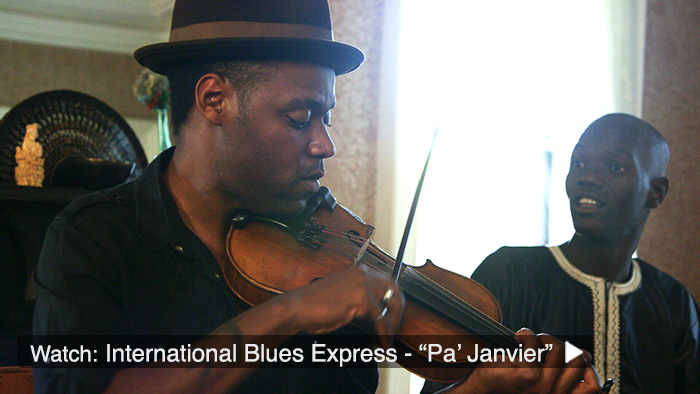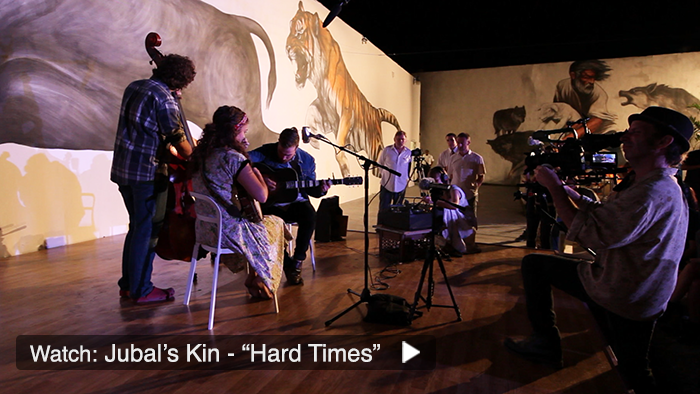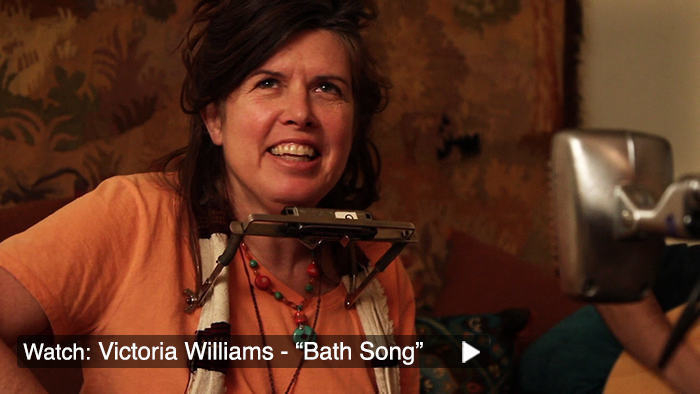We woke up this week in Memphis, which feels like a home away from home to us now. We’re back in Tennessee after a week in Louisiana, our car filled with freshly cut records and as many of the spoils of Bayou cuisine as we could cram in around our gear. Last week was a wild one.
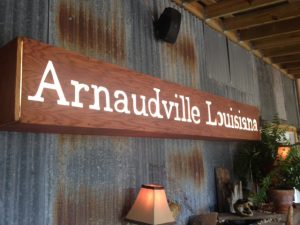 Our first stop once we broke the Louisiana state line was Arnaudville, where we were the guests of Louis Michot, Ashlee Michot and their sons for the weekend. Louis is a member of the phenomenal Lost Bayou Ramblers and a powerful fiddler with a voice straight out of the past. He and his wife are lively, fascinating keepers of a deep Cajun tradition. Louis built their beautiful house himself using old prairie methods mixed with modern ones, and Ashlee is a writer and translator of the music, lyrics, culture and life of their area. Along with the amazing accordionist Corey Ledet, the pair played the traditional Cajun song “Mon Chapeau” and “Maison Blanche,” an original that Ashlee had written.
Our first stop once we broke the Louisiana state line was Arnaudville, where we were the guests of Louis Michot, Ashlee Michot and their sons for the weekend. Louis is a member of the phenomenal Lost Bayou Ramblers and a powerful fiddler with a voice straight out of the past. He and his wife are lively, fascinating keepers of a deep Cajun tradition. Louis built their beautiful house himself using old prairie methods mixed with modern ones, and Ashlee is a writer and translator of the music, lyrics, culture and life of their area. Along with the amazing accordionist Corey Ledet, the pair played the traditional Cajun song “Mon Chapeau” and “Maison Blanche,” an original that Ashlee had written.
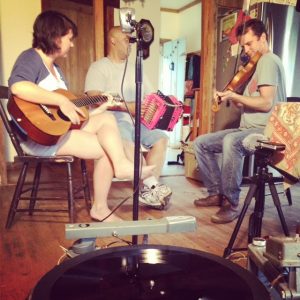 After a night in Lafayette checking out some young French-singing musicians with Louis and Ashlee, we spent the next day hiking out to an old house in the woods forgotten until recently and in serious, glorious disrepair. Exploring the property with Louis, Ashlee and their two young sons was a perfect way to see how the life of a Cajun family in Arnaudville, Louisiana has changed, and how it is still the same. The house, like Louis’, is built by hand, and filled with the echoes of family life. The children’s bed in the attic still remains, though it takes a death-defying jump up onto a falling down outdoor staircase to reach it. We were awed again and again by Louis and Ashlee’s extensive knowledge of the history of the area, their families and their culture. It was an unforgettable two days of stories and music at the Michots.
After a night in Lafayette checking out some young French-singing musicians with Louis and Ashlee, we spent the next day hiking out to an old house in the woods forgotten until recently and in serious, glorious disrepair. Exploring the property with Louis, Ashlee and their two young sons was a perfect way to see how the life of a Cajun family in Arnaudville, Louisiana has changed, and how it is still the same. The house, like Louis’, is built by hand, and filled with the echoes of family life. The children’s bed in the attic still remains, though it takes a death-defying jump up onto a falling down outdoor staircase to reach it. We were awed again and again by Louis and Ashlee’s extensive knowledge of the history of the area, their families and their culture. It was an unforgettable two days of stories and music at the Michots.
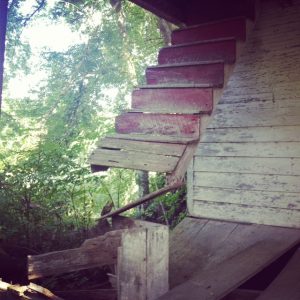 We bid them farewell and headed back to Lafayette to meet Chris Segura of the band Feufollet who we planned to record the next day. He wanted us to hear some of the recordings he works with at the Archive of Cajun Music at the University of Louisiana in Lafayette. In 1934 Alan Lomax had visited the region and recorded many local Cajun musicians who had never been recorded before, and many who never would be recorded again. The performances he played for us, dubbed from the original discs at the Library of Congress, were breathtaking. Particularly recordings of the Hoffpauir sisters, all under the age of 9, singing songs their father had taught them in French, and a dizzy, strange and beautiful fiddle recording by a man called simply “Mr. Barnu” in the sleeve notes. One of the most interesting discoveries, Chris told us, has been that so many of the musicians Lomax recorded in that session are ancestors and relatives of folks still living in the area today. Including himself and his Feufollet bandmate Chris Stafford.
We bid them farewell and headed back to Lafayette to meet Chris Segura of the band Feufollet who we planned to record the next day. He wanted us to hear some of the recordings he works with at the Archive of Cajun Music at the University of Louisiana in Lafayette. In 1934 Alan Lomax had visited the region and recorded many local Cajun musicians who had never been recorded before, and many who never would be recorded again. The performances he played for us, dubbed from the original discs at the Library of Congress, were breathtaking. Particularly recordings of the Hoffpauir sisters, all under the age of 9, singing songs their father had taught them in French, and a dizzy, strange and beautiful fiddle recording by a man called simply “Mr. Barnu” in the sleeve notes. One of the most interesting discoveries, Chris told us, has been that so many of the musicians Lomax recorded in that session are ancestors and relatives of folks still living in the area today. Including himself and his Feufollet bandmate Chris Stafford.
 Yvette Landry, a friend of the band and a musician herself (and also a descendent of Lomax-recorded musicians) opened up her lovely house for us to record Feufollet. And multi-talented guy that he is, Chris Segura got a crawfish étouffée cooking so that it would be ready when we were done. Feufollet’s classic Cajun lineup put us to the test as we room mixed a fiddle, accordion, guitar, piano, upright bass and triangle plus two vocalists. But it worked to a beautiful effect as they performed “Si t’as Fini Avec Moi” and an original in English written by Kelly Jones-Savoy “Tired of Your Tears.”
Yvette Landry, a friend of the band and a musician herself (and also a descendent of Lomax-recorded musicians) opened up her lovely house for us to record Feufollet. And multi-talented guy that he is, Chris Segura got a crawfish étouffée cooking so that it would be ready when we were done. Feufollet’s classic Cajun lineup put us to the test as we room mixed a fiddle, accordion, guitar, piano, upright bass and triangle plus two vocalists. But it worked to a beautiful effect as they performed “Si t’as Fini Avec Moi” and an original in English written by Kelly Jones-Savoy “Tired of Your Tears.”
It was such a pleasure to hear French being spoken just about everywhere by everyone young and old. And to see how having the language as a distinctive cultural asset bonds musicians to each other and to the traditions of their families.
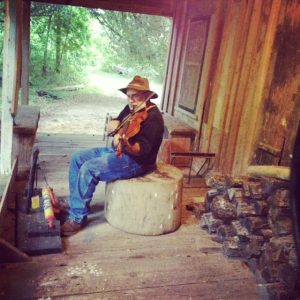 About three hours north in Marksville, we arrived the next day at the house of Gerard Dupuy. We’d heard his name a few times in the week leading up and in the months before we came, from Adam Arcuragi, who had played a show with him in Marksville, and from Louis, who is a distant cousin of Gerard’s. He’s called the Cajun Stump Jumper because he brings a Cyprus stump with him to shows and leaps up onto it in moments of particular spirit. These moments seem to characterize Gerard’s existence. In the days we spent with him in his beautiful house – which he built himself and improved over the course of 30 years to include church windows and vaulted ceilings – he introduced us to everyone and everything he possibly could in his area.
About three hours north in Marksville, we arrived the next day at the house of Gerard Dupuy. We’d heard his name a few times in the week leading up and in the months before we came, from Adam Arcuragi, who had played a show with him in Marksville, and from Louis, who is a distant cousin of Gerard’s. He’s called the Cajun Stump Jumper because he brings a Cyprus stump with him to shows and leaps up onto it in moments of particular spirit. These moments seem to characterize Gerard’s existence. In the days we spent with him in his beautiful house – which he built himself and improved over the course of 30 years to include church windows and vaulted ceilings – he introduced us to everyone and everything he possibly could in his area.
 We learned so much about the history of Louisiana. Gerard is an energized, gregarious living record of the whole place. With him we saw the town, ate the best crab burger and Cajun boudin sausage around, stopped by Bailey’s, the local venue where Gerard sometimes plays. We surveyed Gerard’s more than 50-acre property including a beautiful 1920s cabin where his stump lives and where he played us some improvised songs. At the end of the second day he cut a record of a Mardi Gras call, the Cajun Mardi Gras during which a captain leads the town on a horseback ride to gather the supplies for the meal they will all eat together at the party that night. His style of fiddle and upright bass and singing are ethereal, like a musical séance.
We learned so much about the history of Louisiana. Gerard is an energized, gregarious living record of the whole place. With him we saw the town, ate the best crab burger and Cajun boudin sausage around, stopped by Bailey’s, the local venue where Gerard sometimes plays. We surveyed Gerard’s more than 50-acre property including a beautiful 1920s cabin where his stump lives and where he played us some improvised songs. At the end of the second day he cut a record of a Mardi Gras call, the Cajun Mardi Gras during which a captain leads the town on a horseback ride to gather the supplies for the meal they will all eat together at the party that night. His style of fiddle and upright bass and singing are ethereal, like a musical séance.
Since the Red River abuts his property, for our last morning in Marksville, Gerard took us on a boat ride to a small river island. We thanked him and bid him adieu and left overwhelmed, spinning with the stories and experiences of the week.

